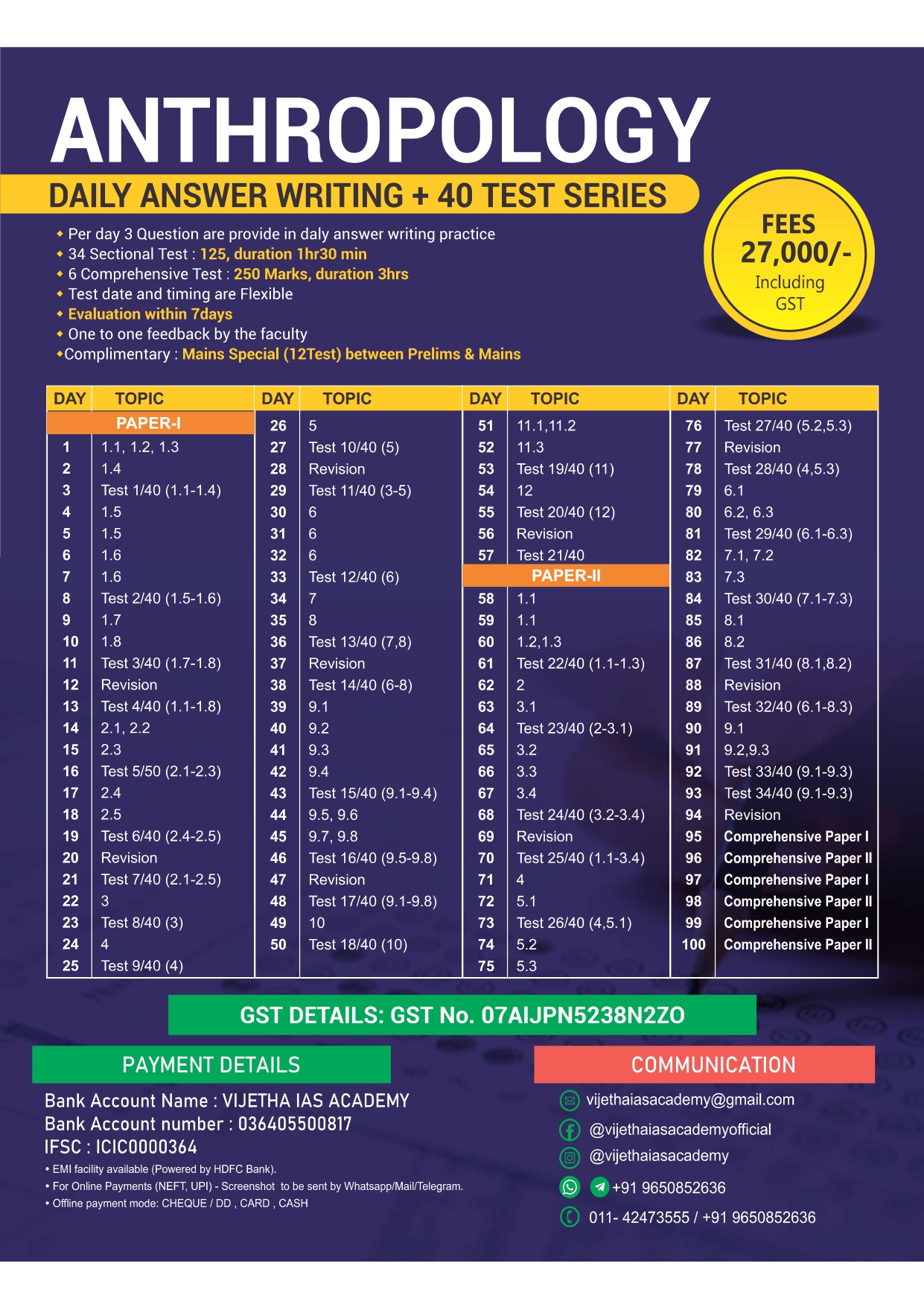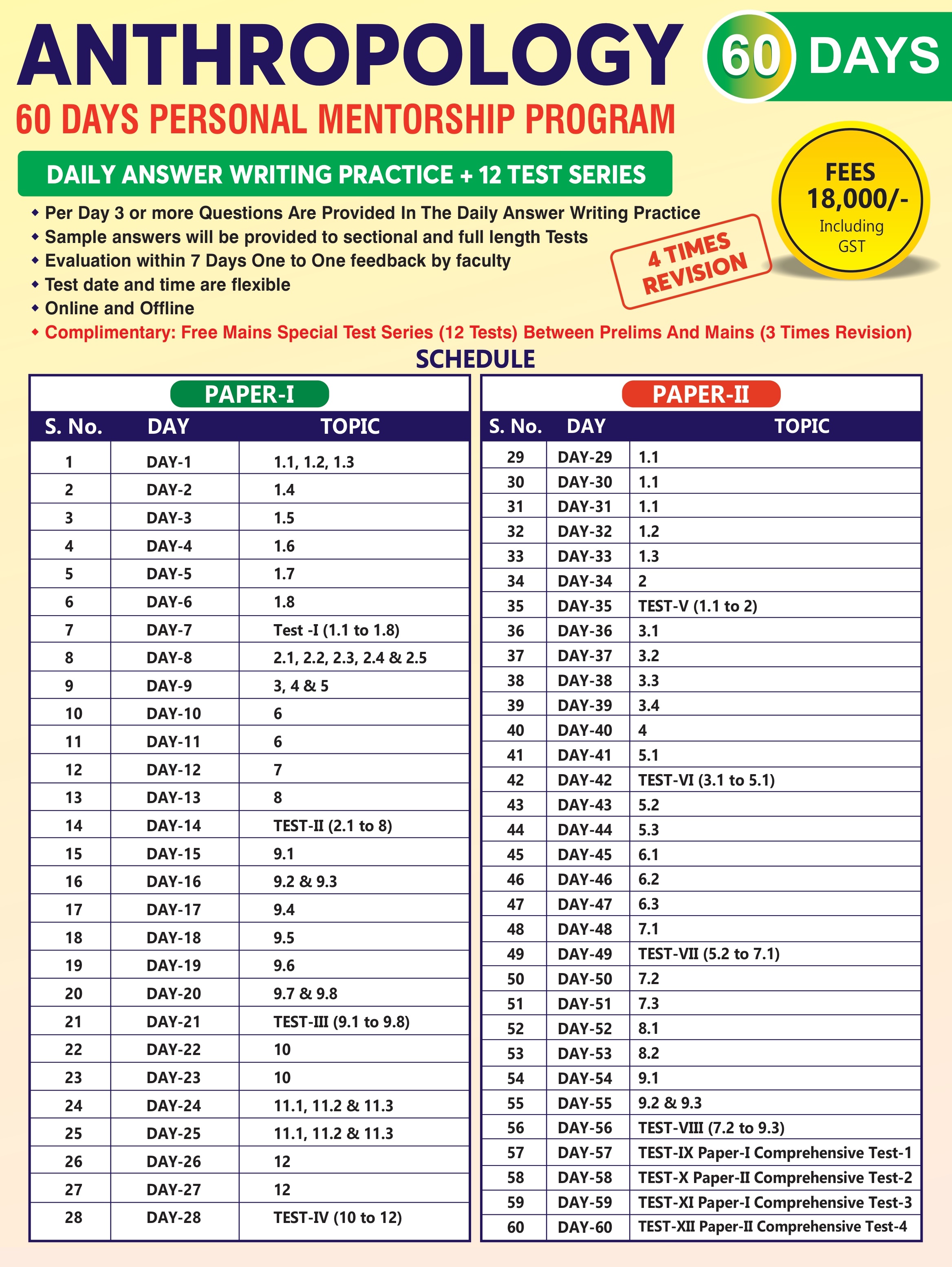
Elucidate the resurgence of ethno-nationalism from an anthropological lens.
(15 Marks) Anthropology Optional Paper CSE 2024
Introduction
Ethno-nationalism refers to a form of nationalism where the ethnic identity of a group becomes the basis for political mobilization, often emphasizing the distinctiveness and rights of the ethnic group within a state or region. In recent decades, there has been a resurgence of ethno-nationalism across the globe, driven by factors such as globalization, migration, and perceived threats to cultural identity. From an anthropological perspective, ethno-nationalism can be understood as a reaction to social, political, and economic changes, and a way for communities to assert their cultural sovereignty.
Main Body
Anthropological Understanding of Ethno-nationalism:
Ethnicity as a Social Construct: Anthropologists view ethnicity as a socially constructed identity, formed through shared language, culture, religion, or history. Ethno-nationalism emerges when ethnic groups mobilize these cultural markers to assert political rights or seek greater autonomy within or outside the framework of a nation-state.
Primordial vs. Instrumentalist Approaches: Anthropologists often debate between primordialism, which sees ethnic identity as deeply rooted and timeless, and instrumentalism, which argues that ethnic identities are politically constructed to achieve specific goals, such as statehood or access to resources.
Factors Driving the Resurgence of Ethno-nationalism:
Globalization and Cultural Insecurity:
The forces of globalization—economic integration, migration, and the spread of global culture—have triggered fears of cultural erosion. Communities turn to ethno-nationalism as a response to safeguard their traditions, languages, and cultural practices from homogenization.
Political Marginalization: Many ethnic groups feel politically marginalized in multi-ethnic states, where they are denied representation or control over resources. In such cases, ethno-nationalism serves as a political movement aimed at rectifying these grievances, as seen in movements like the Kurds in the
Middle East or Catalonia in Spain.
Historical Memory and Identity:
Anthropologists emphasize the role of collective memory in ethno-nationalism. Historical events, such as colonization, wars, or forced migrations, often become central narratives in the resurgence of ethno-nationalist movements, as these communities seek reparation or recognition of past injustices.
Case Studies in Ethno-nationalism:
Scotland and Catalonia: Both regions have experienced a resurgence of ethno-nationalism driven by historical identity and the desire for greater autonomy or independence. In Catalonia, cultural and linguistic differences have fueled demands for independence from Spain, while Scotland’s movement is tied to the preservation of its distinct legal and cultural traditions.
Indigenous Movements:
In countries like Canada and Australia, indigenous groups have adopted ethno-nationalism to fight for land rights and cultural preservation. Their movements focus on achieving self-determination and regaining control over ancestral territories.
South Asia: In India, ethno-nationalism has manifested in movements such as the Naga struggle for independence and the Gorkhaland movement. These groups seek autonomy based on ethnic distinctiveness and cultural identity, often citing historical marginalization by the central government.
Impact of Ethno-nationalism:
Political Fragmentation: The resurgence of ethno-nationalism can lead to political fragmentation within states, as ethnic groups push for regional autonomy, federalism, or even secession. This can challenge the stability of multi-ethnic nations, as seen in the disintegration of Yugoslavia.
Cultural Revitalization: On the positive side, ethno-nationalism often leads to the revitalization of cultural practices, languages, and traditions. Communities invest in preserving and promoting their cultural heritage, which strengthens group solidarity.
Conflict and Violence: In some cases, ethno-nationalism can fuel ethnic conflict or violence, particularly when groups compete over resources or political power. The Rwandan Genocide and the ongoing conflict in Myanmar with the Rohingya are tragic examples of how ethno-nationalism can exacerbate divisions and lead to violence.
Anthropological Critique:
Anthropologists critique ethno-nationalism for sometimes promoting exclusionary politics, where the focus on ethnic identity may marginalize minorities within the group or reinforce ethnic hierarchies. Additionally, ethno-nationalist movements can be manipulated by political elites for personal or group gain, detracting from the broader goals of social justice or inclusion.
Global vs. Local Dynamics: While ethno-nationalism is a local phenomenon rooted in specific historical and cultural contexts, it is increasingly influenced by global political trends. Anthropologists stress the need to examine how international politics, diaspora networks, and transnational identities contribute to the shaping of ethno-nationalist movements.
Conclusion
The resurgence of ethno-nationalism reflects deeper concerns about identity, cultural survival, and political autonomy in the face of global changes. From an anthropological perspective, it can be viewed as both a reaction to external pressures and a means of reclaiming sovereignty and cultural rights. However, while ethno-nationalism can promote cultural preservation and political empowerment, it also raises concerns about exclusion, conflict, and social fragmentation. A balanced understanding of its causes and consequences is essential for addressing the complex dynamics of ethno-nationalism in a globalized world.
Anthropology Test Series Programme (Online + Offline))
We provide Anthropology Daily Answer Writing a range of programs designed to cater to various stages of UPSC preparation. Whether you're just starting out, have attempted the Mains before, or are getting ready for Mains 2024, we have the right option for you. Allow us to assist you in choosing the course that best fits your needs.
|
Level of Preparation |
Test Series Program |
Test Series Content |
Test Schedule |
|
Self-study of Anthropology Optional |
Anthropology 100 Days Personal Mentorship Program |
Daily answer writing, 34 sectional tests, 6 comprehensive tests, and complementary Mains Special 12 tests (between prelims and mains) |
|
|
Revise whole syllabus through Daily Answer Writing Practice and Tests |
Anthropology DAW Mentorship Program |
Daily Answer Writing Practice and 8 sectional and 4 Full Length tests |
|
|
Revise whole syllabus through Sectional and Full Length Tests |
Anthropology Tier- I T-40 Test Series |
34 Sectionals and 6 Full Length Tests |
|
|
Written Mains earlier and need more practice |
16-Anthropology Tier II Test Series |
10 sectional and 6 Full-Length Tests. |
|
|
Cleared Prelims 2023 and are preparing for Mains 2023 |
Mains Special 12 Tests program |
8 Sectional and 4 Full-Length Tests |
ANTHROPOLOGY MAINS SPECIAL COURSES
Enroll in our Anthropology Mentorship Program today and take the first step towards achieving your UPSC goals!
1) If you are going for Self study of Anthropology Optional and looking for a Comprehensive Program that includes Daily Answer Writing, 34 Sectional tests, 6 Comprehensive tests, and Complementary mains special 12 tests (between prelims and mains), our Anthropology 100 Days Personal Mentorship Program is the perfect choice.
2) If you want to revise Whole Syllabus through Daily Answer Writing Practice and 8 sectional and 4 full length tests, then our Anthropology DAW Mentorship Program is the best fit for you.
3) If you want to revise Whole Syllabus through 34 Sectionals and 6 Full Length Tests then Anthropology Tier- I T-40 Test Series is for you.
4) If you have written Mains earlier and need more practice, then our 16-Anthropology Tier II Test Series is a great option. This test series includes 10 sectional and 6 full-length tests.
5) if you have cleared Prelims 2023 and are preparing for Mains 2023,our Mains Special 12 Tests program is a must-have. This program includes 8 sectional and 4 full-length tests to help you prepare for the big day.
For more information on Vijetha IAS Academy’s Anthropology mentorship programs Deatils : https://vijethaiasacademy.com/anthropology-test-series
Anthropology 100 Days Personal Mentorship Program ( 7 + 3 Times Revision )

Anthropology 60 Days Personal Mentorship Program ( 4 + 3 Times Revision )

For more information: https://vijethaiasacademy.com/anthropology-test-series
Details Of Anthropology Classes Program
Top Anthropology Optional IAS Coaching Center in Delhi Vijetha IAS Academy | Best Anthropology Optional IAS Coaching in Delhi
Fee Structure:
- Tier 1: Rs. 55,150/- (3 Years Validity of Offline/Live Batch)
- Tier 2: Rs. 42,000/-
- Tier 3: Rs. 36,000/-
Batch Size: 50 – 60 Students
UPSC Notes
Anthropology Optional IAS Coaching Notes, IAS Exam Preparation Booklets, IAS optional coaching Notes, UPSC Coaching Notes, Video Lectures, Live Classes with faculty, Chat Facility Available
Teachers Name: N P Kishore Sir
Past Result
- Last Years Result 2023
- 35 Total Selections in CSE 2023
Google Reviews: 4.9 out of 5 stars
Website: Vijetha Anthropology Optional IAS Coaching in Delhi (https://vijethaiasacademy.com)
Faculties of Vijetha IAS Academy
- N P Kishore Sir
Features
- Vijetha IAS Academy offers Online and offline Courses for better preparation of Anthropology Optional Strategy for UPSC in Delhi.
- For better Anthropology optional Exam Preparation, Vijetha IAS Academy Delhi Conducts the Motivational IAS Session.
- Vijetha IAS Academy provides you with the CASE STUDIES on the pattern of the real-time IAS Exam which is helpful for better preparation of the Best Coaching for UPSC Anthropology Optional Optional IAS Examination.
- DAW & WAW – Revision Through Daily & Weekly Answer Writing Practice is offered by Vijetha IAS Academy for better result of the Anthropology Optional IAS examination.
Advantages of joining Vijetha IAS Academy
- Best Faculties for Anthropology Optional IAS Coaching in Delhi
- Best facilities, infrastructure and updated Case Studies Booklets and Notes for better preparation of the Anthropology Optional IAS Examination in Delhi.
- Best result in Past years for Anthropology Optional Strategy for UPSC Examination in Delhi
- Best Rated coaching institute for Anthropology Optional IAS Examination in Delhi.
- Vijetha IAS Academy also provides recorded lectures videos, notes which is very helpful for better preparation of Anthropology Optional IAS Coaching in Delhi
Fees Structure of Vijetha IAS Academy
|
Tier 2 |
Tier 1 |
Tier 3 |
BATCH STARTS FROM |
|
42,000/- |
55,150/- (3 Years Validity Offline/Live Batch) |
36,000/- |
REGISTRATION – START |
Fees Structure of Vijetha IAS Academy
|
Course Name |
Fees Amount |
Course Duration |
|
GS Offline (Pre + Mains+ CSAT) with Essay+Answer Writing |
Rs.99,000 (Including GST) |
400+ Days |
|
GS Online |
Rs.18,999 (Including GST) |
400+ Days |
|
GS Mentorship Programme |
Rs.29,999 (Including GST) |
1 Year |
For more information on our courses, visit our Anthropology Courses page. Explore our Test Series and Online Courses for flexible learning options.
Vijetha IAS Academy
Add. 2nd Floor, 50, Shankar Road, Block 7, Old Rajinder Nagar, Rajinder Nagar, New Delhi, Delhi 110060
MOB. 096508 52636
Open 7 Am : Closes 9 PM
Keywords:
anthropology 2024 question paper, Anthropology optional subject question paper 2024, Anthropology optional 2024 question paper, Anthropology Optional Coaching UPSC, Vijetha IAS Academy Anthropology, Anthropology crash course UPSC, Anthropology daily answer writing UPSC, Kishore sir Anthropology, ethnonationalism, anthropological analysis, cultural identity.
